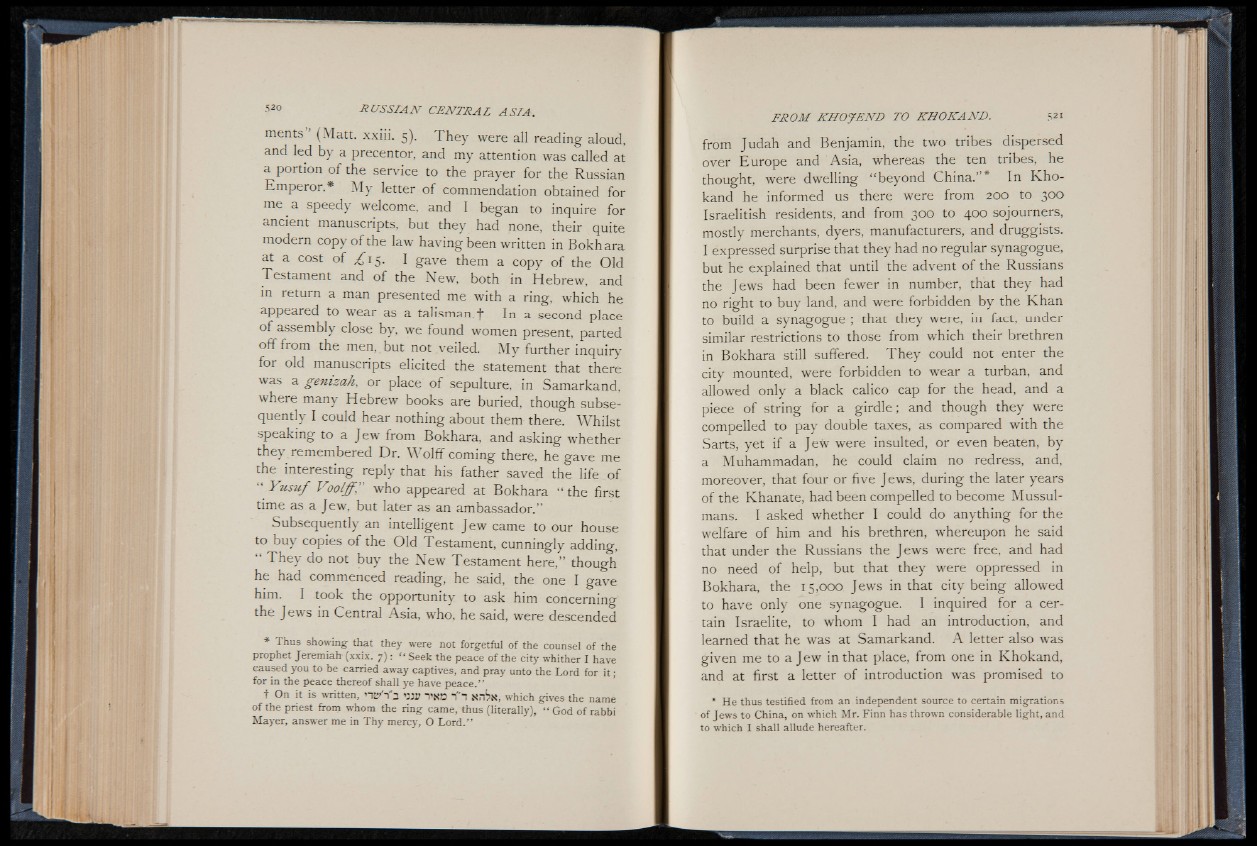
ments (Matt, xxiii. 5). They were all reading aloud,
and led by a precentor, and my attention was called at
a portion of the service to the prayer for the Russian
Emperor.* My letter of commendation obtained for
me a speedy welcome, and I began to inquire for
ancient manuscripts, but they had none, their quite
modern copy o f the law having been written in Bokhara
at a cost o f ^ 15 . I gave them a copy of the Old
Testament and of the New, both in Hebrew, and
in return a man presented me with a ring, which he
appeared to wear as a talisman, j* In a second place
o f assembly close by, we found women present, parted
off from the men, but not veiled. My further inquiry
for old manuscripts elicited the statement that there
was a genizah, or place o f sepulture, in Samarkand,
where many Hebrew books are buried, though subsequently
I could hear nothing about them there. Whilst
speaking to a Jew from Bokhara, and asking whether
they remembered Dr. Wolff coming there, he gave me
the interesting reply that his father saved the life o f
“ Y u su f Voolff? who appeared at Bokhara “ the first
time as a Jew, but later as an ambassador.”
Subsequently an intelligent Jew came to our house
to buy copies of the Old Testament, cunningly adding,
“ They do not buy the New Testament here,” though
he had commenced reading, he said, the one I gave
him. I took the opportunity to ask him concerning
the Jews in Central Asia, who, he said, were descended
* Thus showing that they were not forgetful of the counsel of the
prophet Jeremiah (xxix. 7 ) : “ Seek the peace of the city whither I have
caused you to be carried away captives, and pray unto the Lord for i t ;
for in the peace thereof shall ye have p eace.”
t On it is written, TND which gives the name
o f the priest from w hom the ring came, thus (literally), “ God o f rabbi
Mayer, answer me in Thy mercy, O Lord.”
from Judah and Benjamin, the two tribes dispersed
over Europe and Asia, whereas the ten tribes, he
thought, were dwelling “ beyond China.” * In Kho-
kand he informed us there were from 200 to 300
Israelitish residents, and from 300 to 400 sojourners,
mostly merchants, dyers, manufacturers, and druggists.
I expressed surprise that they had no regular synagogue,
but he explained that until the advent of the Russians
the Jews had been fewer in number, that they had
no right to buy land, and were forbidden by the Khan
to build a synagogue ; that they were, in fact, under
similar restrictions to those from which their brethren
in Bokhara still suffered. They could not enter the
city mounted, were forbidden to wear a turban, and
allowed only a black calico cap for the head, and a
piece of string for a girdle; and though they were
compelled to pay double taxes, as compared with the
Sarts, yet if a Jew were insulted, or even beaten, by
a Muhammadan, he could claim no redress, and,
moreover, that four or five Jews, during the later years
of the Khanate, had been compelled to become Mussulmans.
I asked whether I could do anything for the
welfare of him and his brethren, whereupon he said
that under the Russians the Jews were free, and had
no need of help, but that they were oppressed in
Bokhara, the 15,000 Jews in that city being allowed
to have only one synagogue. I inquired for a certain
Israelite, to whom 1 had an introduction, and
learned that he was at Samarkand. A letter also was
given me to a J ew in that place, from one in Khokand,
and at first a letter of introduction was promised to
* He thus testified from an independent source to certain migrations
of Jews to China, on which Mr. Finn has thrown considerable light, and
to which I shall allude hereafter.